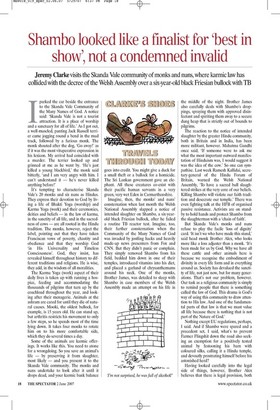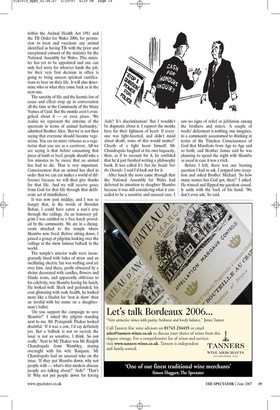Shambo looked like a finalist for 'best in show',
Shambo looked like a finalist for 'best in show', not a condemned invalid Jeremy Clarke visits the Skanda Vale community of monks and nuns, where karmic law has collided with the decree of the Welsh Assembly over a six-year-old black Friesian bullock with TB Iparked the car beside the entrance to the Skanda Vale Community of the Many Names of God. A notice said: `Skanda Vale is not a tourist attraction. It is a place of worship and a sanctuary for all of life.' As I got out, a well-muscled, panting Jack Russell terrier came jogging round a bend in the mud track, followed by a furious monk. The monk shouted after the dog, 'Go away!' as if it was the most vituperative expression in his lexicon. My arrival had coincided with a murder. The terrier looked up and grinned at me as he went by. 'He's just killed a young blackbird,' the monk said bitterly, 'and I am very angry with him I can't understand it — he's never killed anything before!'
It's tempting to characterise Skanda Vale's 20 monks and six nuns as Hindus. They express their devotion to God by living a life of Bhakti Yoga (worship) and Karma Yoga (work) and their ceremonies, deities and beliefs — in the law of karma, in the sanctity of all life, and in the sacredness of cows — are all rooted in the Hindu tradition. The monks, however, reject the label, pointing out that they have taken Franciscan vows of poverty, chastity and obedience and that they worship God 'in His Universality and Timeless Consciousness'. God, they insist, has revealed himself throughout history to different traditions and religions. He is wise, they add, in the wisdom of all moralities.
The Karma Yoga (work) aspect of their daily lives is taken up with running a hospice, feeding and accommodating the thousands of pilgrims that turn up by the coachload throughout the year, and looking after their menagerie. Animals at the ashram are cared for until they die of natural causes. Mooki, the oldest bullock, for example, is 15 years old. He can stand up, but arthritis restricts his movement to only a few steps, so he spends most of the time lying down. It takes four monks to rotate him on to his more comfortable side, which they do several times a day.
Some of the animals are karmic offerings. It works like this. You need to atone for a wrongdoing. So you save an animal's life — by preserving it from slaughter, most likely — and you present it to the Skanda Vale community. The monks and nuns undertake to look after it until it drops dead, and your karmic bank balance goes into credit. You might give a duck for a small theft or a bullock for a homicide. The Sri Lankan government gave an elephant. All these creatures co-exist with their pacific human servants in a very green, very wet Eden in Carmarthenshire.
Imagine, then, the monks' and nuns' consternation when last month the Welsh National Assembly slapped a notice of intended slaughter on Shambo, a six-yearold black Friesian bullock, after he failed a routine TB reactor test. Imagine, too, their further consternation when the Community of the Many Names of God was invaded by jostling hacks and heavily made-up news presenters from Fox and CNN. But they didn't panic or complain. They simply removed Shambo from his field, bedded him down in one of their temples, introduced vitamins into his diet, and placed a garland of chrysanthemums around his neck. One of the monks, Brother James, was detailed to sleep with Shambo in case members of the Welsh Assembly made an attempt on his life in the middle of the night. Brother James also carefully deals with Shambo's droppings, spraying them with approved disinfectant and spiriting them away to a secure dung heap that is strictly out of bounds to pilgrims.
The reaction to the notice of intended slaughter by the greater Hindu community, both in Britain and in India, has been more militant, however. Mahatma Gandhi once said, 'If someone were to ask me what the most important outward manifestation of Hinduism was, I would suggest it was the idea of the cow.' So one can sympathise. Last week Ramesh Kallidai, secretary-general of the Hindu Forum of Britain, warned the Welsh National Assembly, 'To have a sacred bull slaughtered strikes at the very core of our beliefs. Killing Shambo will violate our faith tradition and desecrate our temple.' There was even fighting talk at the HFB of organised passive resistance. Activists are on standby to hold hands and protect Shambo from the slaughterman with a 'chain of faith'.
But Skanda Vale's monks and nuns refuse to play the facile 'loss of dignity' card. 'It isn't we who have made this stand,' said head monk Brother Alex, who looks more like a loss adjuster than a monk. 'It's been made for us by God. Why we have all these cattle and other animals here is because we recognise the embodiment of divinity in every life form and in everything around us. Society has devalued the sanctity of life, not just now, but for many generations. That's not our problem, however. Our task as a religious community is simply to remind people that there is something called the law of God. This drama is God's way of using this community to draw attention to His law. And one of the fundamental parts of that law is that we must value all life because there is nothing that is not part of the Nature of God.'
Nothing except EU regulations, perhaps, I said. And if Shambo were spared and a precedent set, I said, what's to prevent Farmer Flingshit down the road also seeking an exemption for a positively tested animal by festooning his barn with coloured silks, calling it a Hindu temple, and devoutly prostrating himself before his astonished herd?
Having looked carefully into the legal side of things, however, Brother Alex believes that there is legal provision, both within the Animal Health Act 1981 and the TB Order for Wales 2006, for permission to treat and vaccinate any animal identified as having TB, with the prior and exceptional consent of the minister for the National Assembly for Wales. This minister has yet to be appointed and one can only feel sorry for whoever lands the job, for their very first decision in office is going to bring unseen spiritual ramifications to bear on their life. It will also determine who or what they come back as in the next one.
The sanctity of life and the karmic law of cause and effect crop up in conversation all the time at the Community of the Many Names of God. But the monks aren't evangelical about it — or even pious. 'We realise we represent the extreme of the spectrum in terms of animal husbandry,' admitted Brother Alex. 'But we're not then saying that everyone should become vegetarian. You are no more virtuous as a vegetarian than you are as a carnivore. All we are saying is that before consuming that piece of lamb or beef, people should take a few minutes to be aware that an animal has had to die. That is very important. Consciousness that an animal has died in order that we can eat makes a world of difference because we will then give thanks for that life. And we will receive grace from God for that life through that deliberate act of mindfulness.'
It was now past midday, and I was so hungry that, in the words of Brendan Behan, I could have eaten a nun's arse through the railings. As an honorary pilgrim I was entitled to a free lunch provided by the community. We ate in a diningroom attached to the temple where Shambo now lived. Before sitting down, I joined a group of pilgrims looking over the railings at the most famous bullock in the world.
The temple's interior walls were incongruously lined with bales of straw and an oscillating electric fan was wafting cool air over him And there, partly obscured by a shrine decorated with candles, flowers and Hindu icons, and apparently oblivious to his celebrity, was Shambo having his lunch. He looked well. Sleek and garlanded, his coat glistening with rude health, he looked more like a finalist for 'best in show' than an invalid with his name on a slaughterman's bullet.
'Do you support the campaign to save Shambo?' I asked the pilgrim standing next to me. Mr Pratapsinh Thakur looked doubtful. 'If it was a cow, I'd say definitely yes. But a bullock is not so sacred; the issue is not so sensitive, I think. So not really.' Next to Mr Thakur was Mr Ranjith Chandrapala from Wembley, staying overnight with his wife Ranjanie. Mr Chandrapala had an unusual take on the issue. 'If they put Shambo down, why not people with — what's that modern disease people are talking about?' 'Aids?' it! Why not put people down for having Aids? It's discrimination! But I wouldn't be dogmatic about it. I support the monks here for their lightness of heart. If everyone was light-hearted, and didn't mind about death, none of this would matter!' Clearly of a light heart himself, Mr Chandrapala laughed at his own loquacity, then, as if to account for it, he confided that he'd just finished writing a philosophy book. It was called It's Not the Inside Nor the Outside. I said I'd look out for it.
After lunch the news came through that the National Assembly for Wales had deferred its intention to slaughter Shambo because it was still considering what it conceded to be a sensitive and unusual case. I saw no signs of relief or jubilation among the brothers and sisters. A couple of weeks' deferment is nothing, one imagines, to a community accustomed to thinking in terms of the Timeless Consciousness of God that Manifests from Age to Age and so forth, and Brother James said he was planning to spend the night with Shambo as usual in case it was a trick.
Before I left, there was one burning question I had to ask. I popped into reception and asked Brother Michael. 'So how many names has God got, then?' I asked. He winced and flipped my question casually aside with the back of his hand. 'We don't even ask,' he said.





















































 Previous page
Previous page